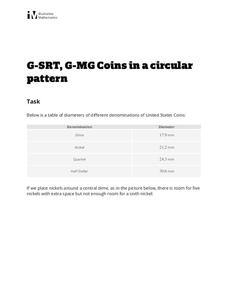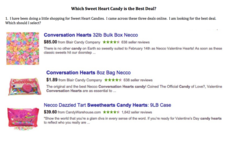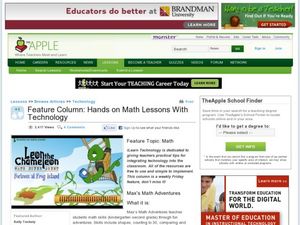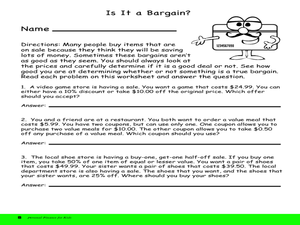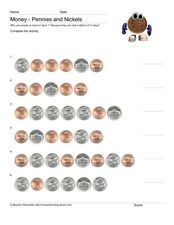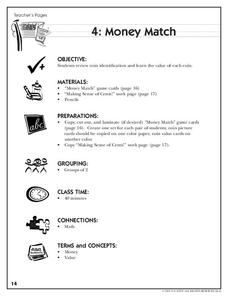Elementary AMC
Earth Day Math
Take some time this Earth Day to nourish the growth of your young mathematicians with this series of task cards. Whether it's the four basic operations, place value, money, or elapsed time, these conservation-themed problems will engage...
Public Schools of North Carolina
Math Stars: A Problem-Solving Newsletter Grade 2
Develop the problem solving skills of your young learners with this collection of math newsletters. Covering a variety of topics ranging from simple arithmetic and number sense to symmetry and graphing, these worksheets offer a nice...
Public Schools of North Carolina
Math Stars: A Problem-Solving Newsletter Grade 4
Fresh off the press, these math newsletters will challenge the problem solving skills of your young mathematicians. With an incredibly wide variety of questions covering the topics of arithmetic and geometry, these unique...
Baylor College
Food: The Math Link
Enrich your study of food science with with these math worksheets. They offer a variety of food-related word problems that are great practice for multiplying, identifying fractions, estimating length, and performing calculations with...
Illustrative Mathematics
Coins in a Circular Pattern
What starts as a basic question of division and remainders quickly turns abstract in this question of related ratios and radii. The class works to surround a central coin with coins of the same and different values, then develops a...
Federal Reserve Bank
Bunny Money
Teach your class about saving, spending, and goal setting with a story about a couple of bunnies who went shopping and related activities. Learners keep track of the bunnies' spending, practice identifying long- and short-term savings...
Yummy Math
Which Sweet Heart Candy Is the Best Deal?
Get the most Valentine's candy for your money with a fun math activity! After examining three deals for buying candy hearts in bulk, young mathematicians decide which deal is the best and use bar graphs to demonstrate their claim. They...
Curated OER
Money Math Carnival
Third graders explore money in a carnival format. In this money lesson, 3rd graders create a carnival of mathematics activities. Students determine the value of money in mixed amounts and explore how to create representations of money.
Curated OER
What's in Your Piggy Bank?
Fill up your piggy banks! First graders find different ways to fill up cute piggy banks with 30 cents. Will they use two dimes and two nickels? Or a quarter and five pennies? Use this activity with groups to reinforce your money math...
Curated OER
Feature column: Hands on Math With Technology
Young learners will view a math adventures video and practice math concepts. Afterwards they will navigate through Internet sites to participate in teacher selected math adventures. This guide walks you through integrating technology...
Curated OER
Recognizing Coins
Help your class identify the different pence and pounds used in Great Britain. Each slide contains an image, the name, and value of British coinage. Great if you're teaching in Britain, if you want to extend your American class's...
Curated OER
How Do You Spend Your Money?
Fifth graders examine ways to save and spend money. They look at ways that people earn, save, and spend money using chapters from Tom Birdseye's Tarantula Shoes. They add and subtract decimals to fill in a worksheet entitled, "Is It a...
Missouri Department of Elementary
How Much Does Smoking Really Cost?
Following a brief survey about tobacco, scholars examine a fact sheet to answer questions about the substance. A practice page challenges the class to determine the cost of the habit using money math. Pupils discuss their findings...
Curated OER
Money: Bucks, Banks, and Business
Put economics and currency exchange rates into a real-world application kids can understand. They'll compare bus fares from various cities around the world. Each child selects three international cities to research. They determine the...
Curriculum Corner
Splashes of Spring Math Centers
Spring into math practice with a set of resources that taps into a variety of math practice. Skills include matching expressions to their definitions, a place value sorting activity, three multiplication and division games, several...
Curated OER
Extension: Money Math
In this money math instructional activity, 4th graders write multiplication equations to solve a set of 6 word problems. Answers are included on page 2. A reference web site is given for additional activities.
Curated OER
Show Me The Money
Third graders explore the value of U.S. money. In this money lesson, 3rd graders print out pictures of money from the Internet and create play money. The students will play a game in which they display the amount of money called out by...
Curated OER
Money: Half Dollars
For this counting coins worksheet, students solve 6 problems in which half dollars are counted and the total amount of money recorded in dollars and cents.
Curated OER
We're In The Money
Learn about the history of money, as well as counterfeiting, budget vocabulary, and money management. Much of the lesson requires a Nova video; however, it also includes numerous worksheets that may be useful even without the video....
Curated OER
Mixed Money 2
In this counting money learning exercise, students count the numbers of pennies and nickels. Students write the total amount of money for the 6 examples.
Curated OER
Money - Mixed Practice
In this counting coins instructional activity, learners examine the 6 sets of coins pictured and record the value of each of the sets shown.
Curated OER
Mixed Money 4
In this money counting worksheet, students count the number of pennies and nickels in each example. Students write the total amount for the 6 problems.
State of Michigan
Pre-K Mathematics
Kick-start children's education with this pre-school math unit. Offering 31 different hands-on learning activities that develop young mathematicians' pattern and shape recognition, basic number sense, and much more, this is a must-have...
Curated OER
Money Match
Playing a game can be educational, pupils use this matching activity to identify coins and their values. This is a great way to have learners practice their money sense.






